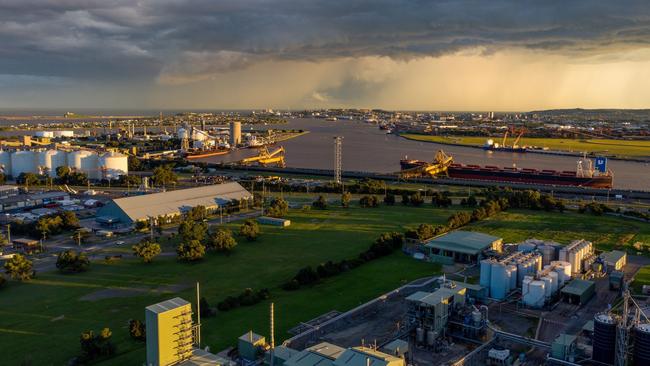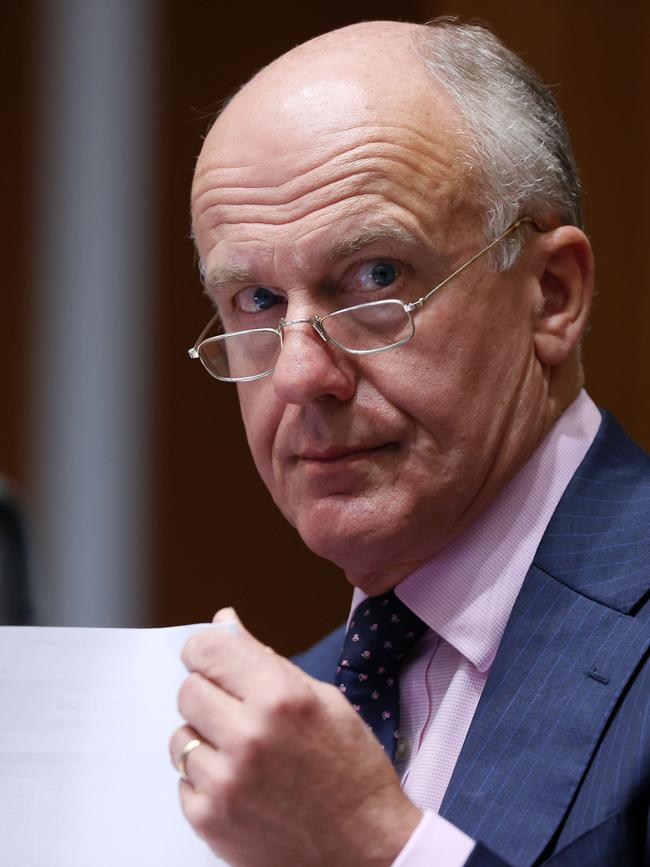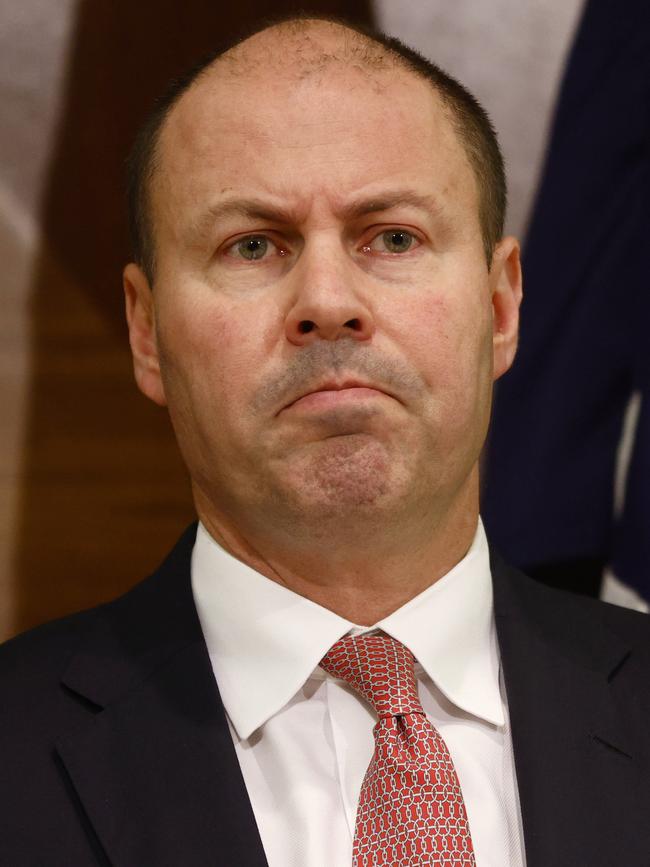Revolt over China’s grip on Port of Newcastle
Coalition MPs demand Josh Frydenberg impose tougher controls on the half-Chinese owned Port of Newcastle.

Fifteen Coalition MPs are demanding Josh Frydenberg impose tougher controls on the half-Chinese owned Port of Newcastle because they fear its monopoly powers could be exploited to impose “punitive costs” to hurt Australian coal exporters.
In a letter to the Treasurer and Scott Morrison, the MPs call for new arbitration measures for the Port of Newcastle, arguing the current regulatory regime gives the “Communist Party of China a geopolitical advantage over the export of Australian coal’’.
The Australian can reveal the letter, sent by Tasmanian Liberal senator Eric Abetz to the Treasurer and Prime Minister last week, outlines fears the port — half-owned by China Merchants Port Holdings — could lift access charges for Australian coal exporters and they would not have a legal mechanism to challenge it.
The letter, sent by Senator Abetz, followed a Senate estimates hearing this month at which Australian Competition & Consumer Commission chair Rod Sims said the world’s largest export coal port was a “monopoly” with no regulatory oversight.

The MPs are calling on Mr Frydenberg to declare the port a monopoly under the National Access Regime — set out in the Competition and Consumer Act – which would ensure that, if a user cannot agree on terms to access the port, the competition watchdog could resolve the dispute through arbitration.
Concern at the lack of a circuit-breaker in existing regulatory provisions in the event of a dispute has been fanned by Beijing’s unofficial blocking of Australian coal imports with resource analysts warning the ban could stay in place for several years.
The MPs are arguing for an arbitration mechanism to be put in place between the port and NSW coal producers “similar to the ACCC arbitration mechanism for other monopoly assets”.
“As you are aware, the Port of Newcastle is a major strategic asset for Australia. It accounts for around 40 per cent of Australia’s coal exports and is the largest coal export port in the world,” the letter says.
“The port also operates as a monopoly, making it incredibly vulnerable to foreign interference. Most coal producers in NSW have no alternative but to use the Port of Newcastle. It is also half-owned by China Merchants Port Holdings, which is a state-owned corporation under the direction of the Communist Party of China.
“It seems incredulous that a half-Chinese-owned company that controls a monopoly bottleneck in the coal export chain can increase charges at their discretion, forcing up prices for Australian coal overseas and making our second-largest export commodity less competitive.” The letter was co-signed by Liberal and Nationals MPs Barnaby Joyce, Matt Canavan, Bridget McKenzie, James McGrath, Sarah Henderson, Alex Antic, Kevin Andrews, Paul Scarr, Phillip Thompson, Llew O’Brien, Concetta Fierravanti-Wells, George Christensen, Gerard Rennick and Susan McDonald.

The Australian has been told more Coalition MPs were expected to sign-up this week.
A spokesman for Mr Frydenberg said the independent National Competition Council had considered on multiple occasions whether the Port of Newcastle should be declared under the National Access Regime and each time had recommended against it.
“The government’s decisions have been consistent with this independent expert advice,” the spokesman said. “Following the NCC’s most recent decision, the Treasurer agreed not to declare the Port of Newcastle.” The Port of Newcastle has welcomed Mr Frydenberg’s decision, as well as a subsequent review of the timeliness of decisions made under the National Access Regime.
Executive director of the Australian Strategic Policy Institute Peter Jennings told The Australian it was clear that “any Chinese company can be subject to pressure from the Chinese Communist Party to meet the party’s political objectives”.
“This is also underlined by China’s national security law, which requires all companies and individuals to assist the Chinese intelligence community if asked to do so. The risk for Australia is that any piece of critical infrastructure which has an element of Chinese ownership is potentially at risk from this type of political behaviour. That is true of the Port of Newcastle, but also for a great deal of the electricity grid and gas infrastructure.”
In their letter, the MPs said they do not want any changes in arbitration determinations to be retrospective, but have sounded the alarm on changes to the National Access Regime included in the May budget.
They say the most recent changes, aimed at improving the timeliness of decisions under the regime, “appears to exacerbate the situation, by retrospectively eliminating previous arbitration determinations relating to the Port of Newcastle”.
“We note that the Department of Prime Minister and Cabinet’s Office of Best Practice Regulation describes this proposal as ‘not consistent with good practice’.”
Senator Abetz told The Australian “what we need is a resolution mechanism in place in the event of a substantial dispute”.
“Trying to create the mechanism after a dispute has already happened gives the whip hand to the monopoly supplier, in this case the Port of Newcastle, which could potentially prejudice 40 per cent of our coal exports.”
The letter expresses grave concerns over China Merchants Port Holdings’ engagement with Beijing’s contentious Belt and Road Initiative.
“We also draw your attention to the fact that China Merchants Port Holdings openly states that its ambition is to implement a ‘Port-Park-City’ development model at the Port of Newcastle, under the Communist Party’s Belt and Road Initiative,” the letter states.
“The company’s parent, China Merchants, also boasts that it is guided by ‘Xi Jinping thought on Socialism with Chinese Characteristics for a New era’.”
Earlier this month, The Australian revealed coalminers were ramping-up their campaign against the port over pricing wars headlined by a longstanding stoush involving Glencore after Mr Sims described as “non-existent” the current regulatory oversight of the port. A Port of Newcastle spokesman told The Australian the government had been “coming up with a commonsense way to bring this impasse to an end”.
“Essentially, this comes down to a commercial dispute between a 100 per cent foreign-owned miner and a 50 per cent locally and foreign-owned port that is holding back the diversification and future of the Hunter and northern NSW,” he said.
NSW Minerals Council chief executive Stephen Galilee has previously described as “concerning” the confusion within the government about “the ACCC’s role in relation to the Port of Newcastle”.
“The Port of Newcastle is a monopoly, yet current government policy allows it to operate without any ACCC oversight or role. This is extremely concerning for us as major users of the port without any alternative provider,” he said earlier this month.







To join the conversation, please log in. Don't have an account? Register
Join the conversation, you are commenting as Logout